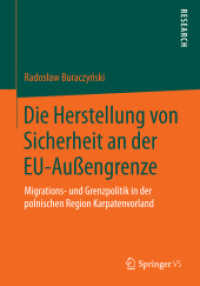Full Description
This volume brings to the fore the interface of religion, women's sexual reproductive health and rights (SRHR), and the sustainable development goals (SDGs) in Zimbabwe. It emphasizes that empowering African women is a pivotal pillar for attaining sustainable development. Contributors discuss the need for implementing structural changes as a prerequisite for social progress and development to occur in Southern Africa. They interrogate the extent to which religious beliefs and practices either promote or impede women's SRHR. The contributors also proffer several ways in which addressing the themes of health for all and equality for all women and girls can make a meaningful contribution towards the fulfillment of the goals set for Agenda 2030.
Contents
Chapter One: Religion, Women's Health Rights and Sustainable Development in Zimbabwe.- Section A: Indigenous Knowledge Systems and Women's Maternal Health.- Chapter Two: A Postcolonial Reflection on Indigenous Knowledge Systems-based Sexual and Reproductive Healthcare: A Case of the Ndau Women in Zimbabwe.- Chapter Three: Exploring Ndau women's ecological wisdom on managing pregnancy and childbirth.- Chapter Four: The interface of human rights and Ndau women's maternal health care rites.- Chapter Five: Mhani Vekusveka: Foregrounding Shangaan Women's role in Nurturing life with a Special Focus on Traditional Maternal Health Practices in Zaka District, Zimbabwe.- Section B: Sexual and Gender Based Violence (SGBV) and other barriers to women's SRHR.- Chapter Six: Pouring ashes on our faces?: An African Womanist perspective on sexual and gender-based violence in Zimbabwe.- Chapter Seven: Sexual and Reproductive Health Challenges Encountered by Female Learners and Female Staff at anInstitution of Higher Learning in Zimbabwe.- Chapter Eight: Religio-Cultural Standpoints hindering adolescent and young women's access to Sexual Reproductive Health and Rights (SRHR) in Zimbabwe.- Chapter Nine: Omasihlalisane: A feminist pastoral response to the plight of young Zimbabwean women migrants entrapped in survivalist marriages in South Africa.- Chapter Ten: Religio-Cultural Norms Constraining Sexual Reproductive Health and Rights for Widows in Zimbabwe.- Section C: Moral and Ethical Dilemmas Inherent Women's SRHR Needs.- Chapter Eleven: Ethical reflections on the effects of Zimbabwe's abortion policy on young women's reproductive health and dignity.- Chapter Twelve: Assisted Reproductive Technologies, Infertility and Women in Zimbabwe.- Chapter Thirteen: Zimbabwean Women's Sexual Reproductive Health and Rights: Ethical and Moral Implications of the Proposed New Marriage Bill.- Chapter Fourteen: The "Small House" Phenomenon and Its Impact on Zimbabwean Women's Sexual Reproductive Health and Rights (SRHR).- Section D: The Impact of Social Media, Literary Texts and Initiation on Women's SRHR Needs.- Chapter Fifteen: Revamping of a "sanctuary without honour": VaRemba women's sexual reproductive health and rights (SRHR) in the enclaves of religion and marriage.- Chapter Sixteen: The Personification of Nature as Mother: Motherhood in Islam with Specific Reference to Varemba Women in Mberengwa, Zimbabwe.- Chapter Seventeen: "Saving Fish from Drowning?": An Africana Womanist Conceptualization of Wo/Manhood and Sexual and Reproductive Health and Rights (SRHR) Through Analyzing Selected ChiShona Literature Texts.- Chapter Eighteen: Media Rhetoric, Women, Silences and Sexual Abuses in the Church.








